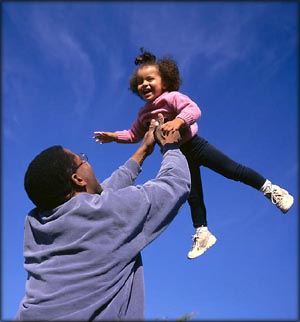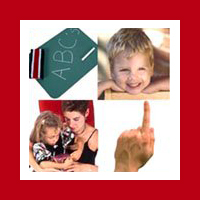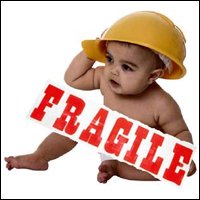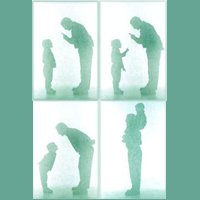
Take This Intelligent Parenting Style Test and Learn more about Yourself as a Parent
- Curious to learn more about yourself as a parent?
- Great!
- Then try this sharp parenting style test to determine your parenting style learn and get fascinating insights into yourself as a parent
How Crises Reveal What Kind of Parent You Are!
When is it we see ourselves most clearly and thereby learn most about ourselves?
Well, typically our individual strengths and weaknesses show most clearly in times of stress and frustration.
This is a time when our own unique coping skills get a change to show themselves!
Therefore this parenting
test will determine your parenting style from the way that you say you react to various 'difficult' or challenging situations with your children.
Which Parents Are Tailor Suited for This Free Personality Quiz?

The parenting questions focus on situations with children in the kindergarten age group.
So this test is perfectly suited for you if you have children around that age, say 2-6 six years of age.
If your children are older, you can still use this free personality quiz for parents, you just need to think back and try to remember how you reacted (or would have reacted) in the quiz question situations.
If however, you would like a test where the questions are of a less practical nature but deal more directly with your parenting mindset - what characterize your parenting beliefs and values - you might really like this advanced parenting style quiz.
Practicalities: How to Take This Parenting Test!

This test is very easy to take.
Just equip yourself with pen and paper and note down your choice of answer (A, B, C or D) for each question as you read and go through the parenting style test.
In the end of the test you count your letters, find out which letter dominates your answers and read about the parenting style that the letter is representative of.
That's it! :-)
Starting the Test
Question 1You are having dinner and your child accidentally drops some food on the floor.What do you do?C. I tell my child that I believe he or she dropped some food on the floor. I ask my child kindly to go and clean up. When my child refuses, I say that we're not leaving the dinner table until it is done.A. I get mad and angrily tell my child how the floor will now be stained and that the stain will properly never get off. After that I demand that my child clean up right now this instant! D. I first try to see if my child notices and does something on his or her own. If the food will stain I ask him or her if he or she would please clean up. If no, then I will help and we will do it together. If the food doesn't stain we might wait till after dinner and do it together then. B. Automatically and without thinking any deeper about it, I go to the kitchen, find a wet cloth and clean up myself. |
Question 2Once again you are having dinner but this time your child is frustrated for some reason and is dropping food on the floor on purpose.What do you do?A. I get furious. Such behavior is unacceptable and must be punished. I go over to my child and hit my child on his or her arm and tell my child to first clean up the mess and then go to his room. And as a punishment my child will have to go to sleep hungry.D. I first make further damage control measures by removing my child's food. Then I try to find out why my child is behaving like this, knowing that something must be bothering my child for him or her to behave in such a way. I go over and take my child on my lap and ask 'What's the matter, are you angry or sad? I take my time until I feel things are resolved even if it may take half an hour. B. I clean it up myself and ask my child to please stop doing that. C. I get angry at my child and ask in an agitated tone of voice why he or she does that. I say that I will not tolerate such behavior and add that if it is not cleaned up, 'you can go to your room and come out when you're ready to clean up'. |
Question 3It's in the later part of the afternoon. You have been shopping for dinner and as the last thing on your way home, you are picking up your child from kindergarten. However, your child is in the middle of playing doesn't want to go home.What do you do?B. You sit down next to your child and say to your child that you need to go now. Your child ignores your, doesn't care and keeps on playing. You sit and wait for a bit and decide to use the thing you know works the best, "If we go now, you can have an ice-cream on your way home."C. You sit down for a while and observe your child playing. After 5 minutes you feel that now it is really time to go. You tell your child that now is time and that he or she needs to finish off his or her game. When your child doesn't finish, you put on a firm voice, take your child's hand and go, despite your child's protests. D. You sit down and you watch your child playing. You observe that your child is having a great time. You really feel that you must go now, but stop to ask yourself, "Am I really busy? What is, in fact, the rush?" If you're actually not in any hurry, you relax and enjoy seeing your child having fun, waiting for a sign in your kid showing that the game is become less interesting. This you take as your cue to take your child home. A. You believe that you are the one that should decide what happens and interrupts your child's game, saying that, 'We're leaving now!" Your child says, "No' and ignores you. You then start dragging your child away while he or she is screaming. |
Question 4Your child hates to have his or her teeth brushed.What do you do?D. I will try to make tooth brushing interesting, make it into a game. As I decide that tooth brushing has to happen, my child may e.g. decide where it may happen. In this way I focus on empowering my child (letting him or her have a degree of say) in something that I decide has to happen.C. I explain to my child why it is necessary to brush one's teeth. I will take my child to the bathroom and say that we're not leaving until we have brushed those teeth. A. I demand that my child goes to the bathroom. If my child doesn't comply I will drag my child there and physically force the tooth brushing through. B. I'm not proud of it, but I hate these conflicts so I tend to skip over the tooth brushing most evenings. |
Question 5Your child is having a playmate over and you see your child hitting the other child.What do you do?C. I immediately go over, ask what happened and tell my kid that he shouldn't his friend for any reason whatsoever. I tell my kid that it's wrong to hit other people and demand that my child apologizes to his or her friend.D. I go over and try to calm the waters first by comforting both but focusing mostly on the one that is most upset. Then when things are more relaxed I show my child the effects of his or her actions. I try to show my child the consequences of his or her actions, 'look how sad your fried is. It hurts when we hit people'. B. I pretend I didn't see what happened but I go over and try to comfort both children the best I can. A. I get very angry with my kid and immediately go over and pull my kid away, scold my child and punish him or her by slapping his or her wrist or saying that now there is no dessert for dinner. |
Question 6Your child doesn't want to eat the healthy greens on his or her plate.What do you do?A. I tell my child that there is no leaving the table until the greens have been eaten.B. I don't want to ruin the harmony at the dinner table so I don't force my child to eat the greens. I accept that he or she doesn't like vegetables. C. I tell my child that greens are good and healthy and necessary for growing up strong. I say to my child that he or she may leave the table when he or she has eaten a little bit of the greens. D. I accept the refusal of the current presentation of the greens. I don't want my child to associate dinner with stress. If my child doesn't want to eat the greens, I have to find another way to get vegetables into him or her. I put on my brainstorming hat and decide to experiment more with greens in the future. |
Question 7It's a normal week day and way past your child's normal bedtime. However, your child refuses to go to bed and wants to stay up longer playing!What do you do?B. If my child doesn't want to go to bed, why should he or she? I can't see why I should force my child to do something he or she doesn't feel like. Plus, I don't feel like getting into a fight over it this late!C. I feel it's important for my child to have a steady routine going to bed at the same time every night. Therefore I will gently but firmly tell my child that it's now time to stop playing and carry him or her into his bed despite my child's resistance. I know that I'm doing it for his or her own good. A. I tell my child in a harsh voice that, 'If you don't go to bed, I will be very angry and there will be no goodnight story!' D. I will first of all try to tune in and assess whether or not my child is actually tired. If I sense that my child isn't tired, I don't feel it will sense to put him to bed. If I myself was having fun and wasn't tired, I wouldn't want to go to bed either. If, however, I sensed that my child was indeed tired, I would give my child two minutes to end his or her game before taking him or her to bed despite protests. |
Question 8You have been told by your child's dentist that if your 3 and a half year-old doesn't stop using the pacifier, there's a risk that his or her teeth may become skewed. However, your child is very attached to his or her pacifier and gets very upset when you take it away.What do you do?D. I first sit down and explain the whole situation to my child. I then decide to involve my child in the solution process trying to come up with new rituals that would be ok as replacement rituals. I ask my child if it would be ok to hold the pacifier in the hand instead or perhaps on the cheeks. I encourage my child to participate in the brainstorming so that that he or she feels like a creator of solutions rather than just feeling powerless and deprived of something.C. I explain to my child, that I have to take away the pacifier because the dentist told us that it is making the teeth skewed. Even though my child becomes very upset, I don't give in and don't give back the pacifier. I warmly but firmly comfort and support my child during this tough 'weaning' period. B. I feel very sorry for my child and can't bear all the tears and crying. In the end I decide to give back the pacifier and let my child keep using the pacifier just a little bit more. A. I take away the pacifier and tell my child that he or she is too big for that now. End of pacifier, no more discussion. |
Question 9Your child is angry because you've said 'no' to something and now in frustration starts throwing things around.What do you do?A. I get very angry at my child as this is behavior is completely unacceptable. I yell for my child to stop this instant or else I will give him or her a good spanking.D. I realize that my child isn't open for words and reason right now so I go and carry my child to his or her room (out of reach of my breakable things). I sit down quietly in the presence of my child and allow my child to be angry for as long as it takes and wait for my child to calm down so that I may connect, preferably on a physical level, e.g. with a hug. Later in the day or perhaps the day after, I will bring up the incident for discussion. B. I ignore the behavior. I believe that if my child doesn't get any attention doing this, he or she will stop by himself or herself. C. I go over to my child and tell him or her that I do not want this kind of behavior, that it's not okay to throw things around. I might let my child have a time-out so that he or she may cool down and think a bit about how he or she behaved. |
Question 10It's morning and you're child is always busy playing when you have to leave for work and doesn't want to go yet. You know that if you don't go now, you will be late for work.What do you do?C. In a gentle but firm voice I tell my child that now it is time to go otherwise Mom will be late for work. I tell my child that I know that I know he or she wants to play but that he or she can continue playing in the kindergarten. As my child still refuses to go, I realize that I have to take control over the situation and carry my child out the front door which I do with a calm attitude despite protests.A. You force your child into his or her clothes while getting angry at your child for his or her disobedience. B. I don't know what to do as I don't want to get my child upset and don't want to get to work late either. Desperate I end up bribing my child with a cookie. D. I try to give my child some sort of control over his or her situation suggesting that he or she could bring a toy to play with on the way there. Then I will try to look at things from above and think of other ways to make the mornings less hectic in general. Perhaps I could somehow change morning routines to make things go more smoothly, or perhaps get us up a little bit earlier. |
The End of the Test!
Let's Count Your Results
Ok, now count your letters and read about your parenting style below:
Scoring Highest on 'A's?
You Probably Have Traits Characteristic of the Authoritarian Parenting Style!
If you had most 'A's in this parenting style test you might be what can be called an authoritarian parent.
These strategies, beliefs and ideas are typical of the authoritarian parenting style:
- Like predictability, structure and rules. Authoritarian families are typically characterized by patriarchal hierarchy and everybody has his or her roles, duties and obligations.
- Have a very 'orderly' mind. They like to look upon the world in terms of good and bad and every opinion, belief and judgment is the 'truth' and therefore unquestionable.
- Tend to display controlling behavior and use strict control as a guideline in their parenting style. There are many rules that are to be followed without discussion and children are kept in a rather tight leash.
- Expect a high level of 'maturity' in their children's behavior (compliant, undemanding and independent) and misbehavior will be effectively punished.
- Do not support creative or original thinking or action in their as it will be seen as a potential threat to the traditional order of things and the nice comfort zone of predictability.
- Don't like engage in too much affectionate behavior towards the children as too much love is seen as being potentially damaging making children spoilt. Children have to roughen up in order to be able to cope with the tough world later on.
Scoring Highest on 'B's?
You Probably Have Traits Characteristic of the Permissive Parenting Style!
If you had most 'B's you might be what can be called a permissive or indulgent parent.
These strategies, beliefs and ideas are typical of the permissive parenting style:
- Don't like traditional rules and child discipline restrictions as they are seen as an impediment to the child's optimal personal growth, individual freedom and creative thinking.
- Don't like to use overt control or force with their children to control and shape their behavior. Children are expected to behave as 'children' and there are therefore no 'mature' standards of behavior.
- Have a large focus on trying to meet their children's needs as much as possible.
- Believe in that everybody has a right to an opinion and therefore have a flat family hierarchy and include their child in decision making processes.
- Tend to avoid potential conflicts and prioritize family harmony and peace of mind.
- Use subtle and manipulative control measures such as bribe or praise to get children to do what is perceived to be needed.
Scoring Highest on 'C's?
You Probably Have Traits Characteristic of the Authoritative Parenting Style!
If you had most 'C's you might be what can be called an authoritative parent.These strategies, beliefs and ideas are typical of the authoritative parenting style:
- Like authoritarian parents, authoritative parents have clear and high standards of how children should behave. There are firm rules but their disciplinary efforts are not meant to restrictive in order to prevent bad behavior, they are rather meant to be positively shaping the children so they become socially responsible.
- Value individuality and self-assertiveness but within an established framework with clear limits. In this way they strive to balance their children's need for autonomy with their idea of social obligations and following the rules.
- Use logic centred control with their children. They prefer to argue and discus their standpoint, will listen to their children but there's never any doubt that the parents have the final say.
- Care about their children's emotional well-being and try to understand their child as well as make an effort of teaching the child social and emotional coping skills.
Scoring Highest on 'D's?
You Probably Have Traits Characteristic of the Unconditional Positive Parenting Style!
If you had most 'D's you might be what can be called an unconditional positive parent.These strategies, beliefs and ideas are typical of the unconditional positive parenting style:
Unconditional positive parents:
- Don't think in terms of good behavior or bad behavior. Are more interested in what the child's behavior reflects, as most 'challenging' behavior is a sign of a need. A need that can be met.
- Strives to meet all the children's needs; physical as well as emotional and existential as a child with satisfied needs is a happy, fulfilled child with optimal possibilities for full personal growth.
- Set rather high standards for their own behavior as they view themselves and their actions as direct role models for their children. They use their Beingness and their most important teaching instrument. What they are, how they appear and behave will be what their children learn and adopt.
- Don't believe in controlling children neither via strict rules and punishments or manipulative techniques such as praise or bribes. Believe more tuning in and working with the children, finding solutions that satisfy everybody
- When rules are applied, it's because they are perceived actually needed for the child's safety, sense of security etc. Rules are not applied because social conventions dictate they should be there.
If you're eager to read more about parenting styles in general or learn about good parenting skills etc. please feel free to use the buttons on your left at the top of this screen.
If you wish more try more parenting style tests, you're welcome to try one of the quizzes and tests below.
Your Positive Parenting Ally,
Birgitte

Want to stay in touch and get the latest news?
Sign up
for my free newsletter
Parent Coaching
- For Inner Peace, Clarity and a Deeper Connection to Your Child
 Being a parent can feel like a double-edged sword. Life with kids may feel like the greatest gift you have ever received, while at the same being hugely challenging, often leaving you confused, stressed and overwhelmed.
Being a parent can feel like a double-edged sword. Life with kids may feel like the greatest gift you have ever received, while at the same being hugely challenging, often leaving you confused, stressed and overwhelmed.
When we feel like this, we've lost touch with ourselves. We can't hear our own inner voice, and it's difficult to know what is 'right' for us and how to act.
I offer in-depth parent coaching to help you regain your balance and get back in touch with yourself. From a place of inner peace and clarity, your will find your own answers which will help you reconnect with your child from a place of unconditional love and acceptance.
Read more about my parent coaching here.
Where Would You Like to Go Next?
 Your Parenting Style: Deep Insights into What Determines Your Parenting Style! |
 12 Different Styles of Parenting and Child Discipline Strategies: Sharp Definitions and Deep Insights. |
 Helicopter Parents and Overprotective Parents: The Truth and Sharp Essence of the Modern Phenomenon of Overparenting. |
 Deep Insights into Narcissistic Parents: Going Behind Their Controlling Behavior and Mapping Out Its Long Term Consequences. |
 Why Well-Meaning Parents Use Controlling Behavior and Become Controlling Parents! Understanding the Essence of Control and the Common Misuse of Power. |
 The Advanced Parenting Style Quiz to Learn Who You Are as a Mom or Dad. |
Back to the top of this page about Take This Intelligent Parenting Style Test and Learn more about Yourself as a Parent
Go to the Positive Parenting Ally Homepage







